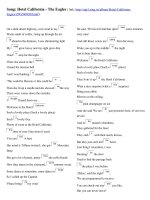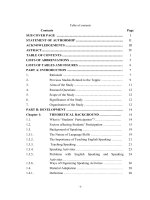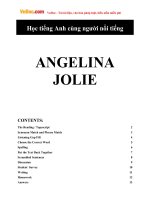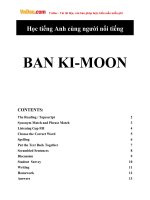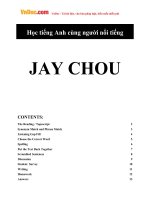Học tiếng Anh qua truyện cười song ngữ - Truyện cười nước Anh (Tập 2): Phần 2
Bạn đang xem bản rút gọn của tài liệu. Xem và tải ngay bản đầy đủ của tài liệu tại đây (1.83 MB, 78 trang )
89
A. Duringthe Second World War it was difficult to
travel by pỉane, because the seats were needed for
important government and army people.
Mr Brown worked for the government during the
war. He was a civilian, and he was doing very secret
work, so nobody was allowed to know how important he
was except very few people.
One day he had to fly to Edinburgh to give a lecture
to a few top people there, but an important army oííĩcer
came to the airport at the last minute, and Mr Brown's
seet was given to him, so he was not able to fly to the
city to give his lecture.
It was not until he reached the city that the
important officer discovered that the man whose seat
he had taken was the one whose lecture he had flown
to the city to hear.
89
B. Trong chiến tranh th ế giới lần thứ hai việc đi lại
bằng máy bay rất khó khăn vì chỗ thường dành cho
những người quan trọng trong chính phủ và qn đội.
Ơng Brown làm việc cho chính phủ trong thời gian
chiến tranh. Ông là nhân viên dân sự nhưng đảm nhận
những việc bí mật. Trừ một sơ" người cịn khơng ai biết
ông quan trọng tối mức nào.
Một hôm ông phải bay đến Edinburgh để giảng bài
cho một sô người đứng đầu ở đó. Nhưng đến phút cuổì
cùng có một viên sĩ quan quan trọng trong quân đội ra
sân bay. Chỗ của ơng Brown phải nhường lại cho người
đó, cho nên ông không thể bay đến thành phô" đó giảng
bài được.
Mãi tới khi đến thành phố ấy, viên sĩ quan quan
trọng kia mới phát hiện ra rằng cái người đàn ông mà
anh ta lấy tranh chỗ chính là người giảng bài mà anh
ta phải bay đến để nghe.
c. BÀI TẬP
A. WHICH OF THESE SENTENCES ARE TRUE (T)
AND WHICH ARE FALSE (F)? WRITE T OR F IN THE
BOXES.
1. Tt was difficult for government and army people to
íìnd seats on plane during the Second World War.
!.J
2. Mr Brown was an important person.
ũ
3. He wanted to go to Edinburgh by plane one day. □
4. His seat was given to somebody else because he
was late.
LJ
5. The important officer went to Edinburgh to give a
lecture.
□
6. The important officer arrived in time for Mr
Brown's lecture, because he went by plane.
n
B. ANSWER THESE QUESTIONS
1. Why did ordinary people find it difficult to go by
plane during the Second World War?
2. Whom did Mr Brown work for?
3. Was he in the army?
4. What work did he do?
5. Why were only very few people allovved to know
how important he was?
6. Why did he have to fly somewhere one day?
7. Whv didn't he manage to get there?
8. What did the important officer find out when he
got to the City?
91
90
A. Peter Judd joined the army when he was
eighteen, and for several months he was taught how to
be a good soldier. He did quite well in everything
except shooting. One day he and his friends were
practising their shooting, and all of them were doing
quite well except Peter. Aíter he had shot at the target
nine times and had not hit it once, the officer who was
trying to teach the young soldiers to school said:
"You're quite hopeless, Peter! Don't waste your last
bullet too! Go behind the wall and shoot yourselt with
ít!".
Peter felt ashamed. He went behind the wall, and a
few seconds later the officer and the other young
soldiers heard the sound of a shot.
"Heavens!", the officer said, "Has that sìlly man
really shot himselí?".
He ran behind the wall anxiously, but Peter was all
right. 'Tm sorry, sir", he said, "but I missed again".
92
B. Peter Judd gia nhập quân đội vào năm 18 tuổi.
Trong mây tháng đầu người ta huâ"n luyện anh trỏ
thành một người lính giỏi. Anh học mơn gì cũng giỏi trừ
môn bắn súng. Một hôm anh và đồng đội tập bắn, ai
bắn cũng tốt trừ Peter. Anh nhằm mục tiêu bắn 9 lần
nhưng không trúng được một viên. Viên sĩ quan dạy
bắn nói rằng:
"Peter, anh thật là vơ vọng! Thơi đừng bắn phí viên
đạn cuối cùng nữa. Đi ra sau tường kia và dùng viên
đạn đó mà tự bắn vào mình".
Peter xấu hơ q. Anh đi ra sau tường. Một vài giây
sau viên sĩ quan và các lính trẻ kia nghe thấy một tiếng
súng.
Viên sĩ quan nói "Trời ơi! Thằng đần độn ấy tự bắn
mình thật à?".
Ơng lo lắng chạy ra phía sau tường, nhưng Peter
khơng bị sao cả.
Anh nói: "Tôi xin lỗi, tôi lại bắn trượt",
c . BÀI TẬP
WHICH OF THESE SENTENCES ARE TRUE (T) AND
WHICH ARE FALSE (F)? WRITE T OR F IN THE BOXES.
1. Peter was good at everything.
2. Peter was not good at shooting.
lJ
3. A lot of other soldiers were bad at shooting too.
J
4. One of Peter's nine bullets hit the target.
—
5. The officer was not pleased with him.
6. The oíĩĩcer thought that Peter had shot himselh
Li
93
91
A. Mr Richards worked in a small seaside town, and
he and his wife had a comíbrtable house near the sea.
During the winter they were quite happy there, but
every summer a lot of their relatives used to want to
cơme and stay with them, because it was a nice place
for a holiday, and it was much cheaper than staying in
a hotel.
Finally on June Mr Richards complained to an
intelligent íriend of his who lived in the same place.
"One of my wife's cousins intends to b rin g her husband
and children and spend ten days with us next month
again. How do you prevent all your relatives Corning to
live with you in the summer?"
"Oh", the íriend answered, "that isn't difficult, I just
borrow money from all the rích ones, and lend it to all
the poor ones. After that, none of them come again".
94
B. Ong Richards làm việc tại một thành phô' nhỏ bên
bờ biên. Hai vợ chồng ông ở một ngôi nhà khang trang
gần bờ biển. Vào mùa đơng họ ở đó rất vui vẻ, nhưng
vào mùa hè rất nhiều họ hàng bạn hữu muốn đến ở nhờ
vì đó là một nơi nghỉ ngơi rất tốt, và ở đó rẻ hơn ở
khách sạn rất nhiều.
Rồi đến một lần vào tháng 6, ông Richards phàn nàn
với ông bạn sông ở trong cùng khu đó. "Tháng sau cơ
em họ nhà tơi mn đưa chồng con đến ở với chúng tôi
10 ngày. Thế anh làm cách nào mà ngăn được người
quen đến ở với anh vào mùa hè?".
Ơng bạn trả lời: "Ơi, chẳng có gì là khó cả. Tơi cứ hỏi
vay tiền của những người giàu có, rồi lại cho những
người nghèo vay lại. Thế là chẳng ai đến đây nữa".
c . BÀI TẬP
A. WHICH OF THESE SENTENCES ARE TRƯE (T)
AND WHICH ARE EALSE (F)? WRITE T OR F IN THE
BOXES.
1. Mr and Mrs Richards did not have many
relatives.
L-i
2. Mr and Mrs Richards often went to stay with
theri relatives in the summer.
L.
3. Mrs Richards's cousin decided to visit them.
Li
4. Mr Richards was not at all happy about this.
[L
5. A ừiend of his told him how to stop visitors.
L.
6. He borrovved money írom his poor relatives, and
lent money to his rích ones.
i-i
95
B. ANSWER THESE QUESTIONS
1. Where did Mr and Mrs Richards li ve?
2. What was their house like?
3. Why were they happier in winter than in
summer?
4. Why did their relatives want to visit them?
5. Who did Mr Richards ask for advice then?
6. What did he say to him?
7. And what did his íriend ansvver?
8. Why did the friend's relatives not want to visit
him again?
c. PUT ONE WORD IN EACH EMPTY PLACE. YOU
WILL FIND ALL THE WORDS IN THE STORY.
George liked the sea, so he lived in a house at the...
His parents and a lot of his other .... lived near him.
George's chairs were very hard, so they were not very...
to sit on... one day his mother... about this, saying: "I
wish you had some soíter chairs, George". But his
íather laughed and answered: "George is an .... man: he
had hard chairs because he .... to ... people ... too long
when they come to visit him! When he wants a soft
chairs, he can... it from our house.
96
92
A. Mrs Scott bought a new hose last year. The walls
of the rooms had been painted a short time before, and
Mrs Scott liked the colours, but the person who had
sold her house had taken the curtain with him, so Mrs
Scott had to buy new ones, and of course she wanteđ to
buy ones whose colour would go with the walls of her
rooms. She discovered that her comb was exactly the
same colour as these waìls, so she always took it with
her whenever she went to look for cloth for curtains.
In one shop she showed the shopkeeper the comb
and then looked at various cloth for curtains for half an
hour with him, untiỉ he got tired and said to her:
"Madam, wouldn't it be easier just to buy some cloth
you ỉike, and then find a new comb to go with that?".
97
B. Năm ngối bà Scott mua một ngơi nhà mới. Trước
khi mua ít lâu các phịng đều được qt vơi lại. Bà Scott
rất thích màu vơi đó. Nhưng người bán nhà cho bà đã
mang hết các tấm rèm cửa đi, cho nên bà Scott phải
mua rèm cửa mới. Bà rất muôn mua rèm cửa hợp với
màu tường. Bà phát hiện ra là cái lược của bà có cùng
màu với màu tường, cho nên cứ đi mua vải rèm ở đâu là
bà đều mang cái lược đi theo.
Một hôm đến một cửa hàng, bà và người bán hàng
cùng đi chọn vải. Một lúc sau anh ta thấy mệt quá, anh
nói: "Thưa bà, thế thì tốt nhất là bà mua một mảnh vải
có màu bà thích, sau đó tìm mua một chiếc lược cùng
màu, th ế có hơn khơng?".
c . BÀI TẬP
A. WHICH OF THESE SENTENCES ARE TRUE (T) AND
WHICH ARE FALSE (F)? WRITE T OR F IN THE BOXES.
1. When Mrs Scott bought her new house, she did
not have the wallspainted.
n
2. She kept the curtains whose colour was rather
like the walls.
n
3. She liked curtains whose colour was very đifferent
from the walls.
D
4. Her comb and the curtains were the same colour.
5. Her comb and thewalls were the same colour.
H
n
6. One shopkeeper suggested that she should get
comb of a different coulour instead of cloth like the
comb.
□
7.
One shopkeeper suggested that she should buy
some cloth which was like the comb and then find
another comb which she liked.
u
B. ANSWER THESE QUESTIONS
1. Why did Mrs Scott not want to ha ve the walls of
her new house painted?
2. Why did she have to buy new curtains?
3. What kind of curtains did she want?
4. Why did she take her comb with her when she
went looking for cloth?
5. What happened in One shop?
6. How did the shopkeeper feel after some time?
7. What did he say to Mrs Scott?
8. Why couldn't Mrs Scott follow his advice?
99
93
A. Helen lived with her sister Mary. Both of them
were about seventy-five years old, and neither of them
had ever married. They had a smaì] old car, and when
they wanted to go somevvhere, which thev did verv
rarely, Mary always drove, because her eyes were
better.
One weekend they drove to a large town to look at
some things which they had read about in the
nevvspaper. Neither of them had been to that town
before.
They were driving along in a lot of traffic when they
turned right into a Street which cars were not allowed
to go into. There was a policemen there, and he blew
his whistle, but Mary did not stop, so he got on his
motorcycle and followẹd them.
After he had ordered them to stop, he said: "Diđn't
you hear me blow my whistle?".
"Yes. we điđ". admitted Mary politely, "But Mummy
told us never to stop when men whistle at, us".
B. Helen sống với bà chị là Mary. c ả hai đều khoảng
75 tuổi và cả hai cùng chúa lấy chồng lần nào. Họ có
một chiếc ơ tơ. Rất ít khi họ đi đâu nhưng cứ khi nào có
việc đi, Mary đều lái xe cả vì mắt bà cịn tốt hơn.
Một hôm cuối tuần, họ đến một thành phô' lớn dể
xem một sô' thứ mà họ đã dọc thâv quảng cáo trên báo.
Cả hai cùng chưa đến thành phơ' đó bao giờ.
Họ lái xe theo dòng xe cộ rồi rẽ tay phải vào một phô'
cấm ô tô qua lại. Người cảnh sát đứng ở góc phơ' ht
cịi gọi lại, nhưng bà Mary không dừng xe. Người cảnh
sát nhảy lên mô tô đuổi theo.
Sau khi ra lệnh cho xe dừng, ann ta noi: "Bà khơng
nghe thâ'y tơi ht cịi sao?".
Mary nhận lỗi một cách lịch sự: "Có ạ. Nhưng tơi
nhớ lời mẹ tôi dặn là khi bọn đàn ông huýt sáo thì dừng
có dừng lại".
c . BÀI TẬP
A. WHICH OF THESE SENTENCES ARE TRUE (T) AND
WHICH ARE FALSE (F)? WRITE T OR F IN THE 30XES.
1. Helen and Mary were sisters.
L.
2. They were quite young.
A
3. They were both married.
L:
4. Mary drove their car.
m
5. A policeman tried to stop her One day.
L:
6. She did not stop, because she didnot hear him
blovy his whistle.
L
B. ANSWER THESE QUESTIONS
1. Where did Mary and Helen drive One day?
2. What did they do in the town?
3. What did the policeman do?
4. And what did Mary do?
5. What did the policeman do then?
6. What did he say to Mary when he stopped her?
7. And what did Mary answer?
8. Had her mother really meant that she should not
stop when a policeman blew his whistle?
c. FIND WORDS IN THE STORY WHICH MEAN
ABOUT THE SAME AS:
1 . a ta n y tim e
2 . big
3. cars, buses, vans, etc...
4. confessed
5. got husbands
6. Mother
7. not rudely
8. Saturday or Sunday
9. seldom
10. told
1 1 . w entafter
94
A. In England nobody under the age of eighteen is
allowed to drink in a public bar.
Mr Thompson used to go to a bar near his house
quite often, but he never took his son, Tom, because he
was too young. Then when Tom had his eighteen
birthday. Mr Thompson took him to his usual bar for
the íirst time. They drank for half an hour, and then
Mr Thompson said to his son: "Now, Tom, I want to
teach you a useíul lesson. You must always be careful
not to drink too much. And how do you know when
you've had enough? Well, Tll tell you. Do you see those
two lights at the end of the bar? When they seen to
have become four, you've had enough and should go
home".
"But, Dad", said Tom, "I can only see one light at the
end of the bar".
103
B. Ở nước Anh, bọn trẻ dưới 18 tuổi không được phép
ng rượu tại các qn rượu.
Ơng Thompson thường hay đến quán rượu gần nhà,
nhưng không bao giờ đưa con trai đi cả vì nó cịn nhỏ
tuổi q. Đến hơm sinh nhật Tom 18 tuổi, ông
Thompson dẫn cậu đến quán rượu ông thường đến. Hai
bô" con uống với nhau khoảng nửa giờ, ơng Thompson
nói vói con: "Tom nàv, tao mn dạy cho mày một bài
học hữu ích. Mày phải cẩn thận đấy đừng bao giờ uống
quá độ. Thế mày có biết uống đến mức nào gọi là đủ
không? Ư, tao sẽ bảo cho. Mày có trơng thấy hai cái đèn
ỏ đằng cuối qn kia khơng? Khi nhìn thây chúng biến
thành bơn, thế thì là đủ và nên về thơi".
Tom nói: "Nhưng thưa bơ", con thấy chỉ có một cái
đèn đỏ thôi ạ".
c . BÀI TẬP
A. WHICH OF THESE SENTENCES ARE TRƯE (T) AND
WHICH ARE FALSE (F)? VVRITE T OR F IN THE BOXES.
1. When Tom were under eighteen. his father took
him to a public bar.
H
2. It were the íĩrst time that he had taken him to his
usual bar.
Q]
3. There were one light at the end of the bar.
□
4. Mr Thompson wanted to teach Tom not to drink
too much.
□
104
5. Mr Thompson thought he saw four lights.
□
6. Tom only saw two.
G
B. ANSYVER THESE QUESTIONS
1. Who can drink in public bars in England?
2. Why did Mr Thompson not take Tom to his usual
bar for a long time?
3. When did he take him?
4. What did they do there?
5. What did Mr Thompson say then?
6. And what did Tom answer?
7. Who had had enough to drink, Tom or his íather?
8. How did Tom know this?
105
95
A. Mr and Mrs Davis had four children. One
Saturday Mrs Davis said to her husband: "The children
haven't got any lessons today, and you're free too.
There’s a fun-fair in the park. Let's all go".
Her husband was doubtíul about this. "I want to
íĩnish some work", he said.
"Oh, forget about it and co me to the fair", his wife
said.
So Mr and Mrs Davis took the children to the funfair. Mr Davis was forty-five years old, but he enjoyed
the fun-fair more than the children. He hurried from
one thing to another, and ate a lot of svveets and nuts.
One of children said to her mother. "Daddy’s
behaving ju st like a small child, isn’t he, Mummy?".
Mrs Davis, was quite tired of following her husband
around by now, and she ansvvered: "He's worse than a
small child, Mary, because he's got his own money!".
106
B. Ong bà Davis có 4 đứa con. Vào một ngày thứ bảy
bà Davis nói với chồng: "Hơm nay bọn trẻ không phải
đên trường, mà ông cũng rỗi rãi, ở cơng viên hiện nay
có trị vui, ta đi đi".
Chồng bà hơi nghi ngị. Ồng nói: "Tơi có việc phải
làm xong đã".
"Thơi, qn việc đi, đi chơi đã". Bà nói.
Ơng bà Davis đưa bọn trẻ ra hội vui. Ông Davis đã
45 tuổi nhưng ơng tham gia vào hội vui cịn sơi nổi hơn
bọn trẻ con. Ơng cứ chạy hết trị chơi nọ sang trò chơi
kia, ăn rất nhiều hạt và kẹo.
Một đứa con nói với mẹ: "Bơ" trơng giống như một
đứa trẻ con ấy mẹ nhỉ”.
Lúc này bà Davis chạy theo chồng cũng đã mệt
nhồi. Bà nói: “Cịn tồi hơn cả một đứa trẻ nữa, Mary ạ,
vì bơ" con có tiền riêng".
c. BÀI TẬP
A. WHICH OF THESE SENTENCES ARE TRUE (T)
AND WHICH ARE FALSE (F)? WRITE T OR F IN THE
BOXES.
1. Mr Davis and his children did not work on
Saturday.
C .Í
2. Mr Davis vvas eager to go to the fun-fair, but his
wife was not.
u
3. The chilđren enjoyed the fun-fair, but Mr Davis
did not.
LJ
107
4. He behaved like a small child.
5. Mrs Davis got tirẹd.
6. Mr Davis did not like the fun-fair because he was
a rich man and wanted something better than that. U
B. ANSWER THESE QUESTIONS
1. How many children did Mr and Mrs Davis have?
2. Where did Mrs Davis suggest that they should
take them?
3. How did Mr Davis feel about this?
4. W hat did he say?
5. What did his wife answer?
6. W hat did he do at the fair?
7. What did one of the children say about him?
8. What did Mrs Davis answer?
108
96
A. Mr Jones bought somethings from a big shop last
month and when he got the bill a few days ago, he
thought that there was a mistake in it, so he
telephoned the shop and asked to speak to the
Accounts Department: "Who do you want to speak to in
the Accounts Department?" the telephone operator
asked.
"It doesn't matter to me", Mr Jones answered. He
did not know the names of any the people who worked
there. He heard notting for a few seconds and then the
operator said: "Hullo, you wanted to speak to someone
in the Acounts Department. diđn't you?".
"Yes, that's right", Mr Jones answered.
"Would you like to speak to Mr Hankinson?", the
operator said.
"Yes, that'lỉ be all right". Mr Jones said patiently, "It
doesn't matter who I speak to".
'Tm sorry", the operator answered, "But Mr
Hankinson isn’t in today".
109
B. Tháng trước ông Jones mua một số thứ ở một cửa
hàng lớn. Cách đây mấy hôm khi nhận phiếu thanh
tốn ơng nghĩ rằng chắc họ tính nhầm gì đây. Ông gọi
điện thoại đến cửa hàng xin nói chuyện với phịng tài
vụ. Người trực điện thoại hỏi: "Thưa ơng, ơng muốn nói
chuyện với ai trong phịng tài vụ?".
Ơng Jones trả lời: "Ai cũng được". Ơng khơng biết
tên của những người làm trong phịng đó. Ơng khơng
nghe thấy ai trả lời nhưng rồi người trực hỏi lại: "A lơ,
ơng mn nói chuyện với một người nào đó trong phịng
tài vụ phải khơng ạ!"
Ơng Jones trả lời "Vâng".
"Ơng mn nói chuyện với ông Hankinson ạ?"
Ổng Jones kiên nhẫn nói: "Vâng, thế cũng được. Tơi
nói chuyện vối ai cũng được".
Người trực điện thoại trả lời: "Tôi xin lỗi, ông
Hankinson hôm nay không đến".
c . BÀI TẬP
A. WHICH OF THESE SENTENCES ARE TURE(T) AND
WHICH ARE FALSE(F)? WRITE T OR F IN THE BOXES.
1. Mr Jones got a bill from a big shop.
ũ
2. He belived that the bill was wrong.
n
3. He only knew Mr Hankinson in the Accounts
Department.
n
4. The telephone operator tried to get Mr Hankinson
for him.
n
was
not in
the
Accounts
6. The telephone operator helped Mr Jones a lot.
B. ANSWER THESE QUESTIONS:
1. Why did Mr Jones telephone the big shop?
2. What dis the telephone operator ask him?
3. What did he answer?
4. What did Mr Jones say?
5. What did the operator ask him then?
6. What did Mr Jones answer?
7. And what did the operator say?
□ □
5. Mr Hankinson
Department that day.
97
A. M r Hodge was a chicken íarmer. He had
hundreds of chickens, and sold the eggs and the meat
and got quite a lot of money for them, but he lived in a
very hot part of the country, and he found that his hens
laid hardly any eggs in the summer. So he decided to
put air-conditioning into his chicken-house so that the
hens would lay well through the year and he cound get
more eggs and in that way earn more money.
The owner of the company which sold the airconditioning came to see him, and when he saw Mr
Hogdếs house, he thought that he might be able to
persuade him to buy some air-conditioning for that too.
"Your wife would be much happier and more
comíortable then", he said to Mr Hodge. But Mr Hodge
was not interested.
"My wife doesn't lay eggs", he said.
112
B. Ong Hodge là người chăn ni gà. Ơng có hàng
trăm con gà. Bán trứng và thịt gà, ông kiếm được khá
nhiều tiền. Nhưng vì nơi ơng ở ỉà một vùng đất khí hậu
nóng cho nên ơng thấy gà hầu như khơng đẻ trứng vào
mùa hè. Vì thế ơng quyết định đặt máy điểu hòa nhiệt
độ vào chuồng gà hy vọng gà sẽ đẻ trứng nhiều quanh
năm, ông sẽ thu hoạch được nhiều trứng hơn, kiếm
'được nhiều tiền hơn.
Người chủ cơng ty bán máy điều hịa nhiệt độ đến
gặp ơng. Khi trơng thấy nhà của ơng Hodge, ơng ta
nghĩ có thể thuyết phục ơng Hodge mua máy điều hịa
nhiệt độ đê lắp vào trong nhà.
Ơng nói với ơng Hodge: "Vợ ông sẽ thấy vui hơn và
thoải mái hơn". Nhưng ông Hodge: khơng có vẻ thích
thú lắm.
Ơng nói: "Vợ tơi khơng đẻ trứng",
c . BÀI TẬP
A. WHICH OF THESE SENTENCES ARE TRUE (T) AND
WHICH ARE FALSE (F)? WRITE T OR F IN THE BOXES.
1. Mr Hodge's chickens laid a lot eggs when the
vveather was hot.
Li
2. Mr Hodge wanted air-conditioning for his
chickens.
D
3. The owner of the air-conditioning company sent a
man to see Mr Hodge.
u
4. The owner of the company wanted to sell as much
air-conditioning as possible.
u
5. Mr Hodge agreed to have air-conditioning to his
house too.
u
6. Air-conditioning in his house would not bring him
more money.
L2




